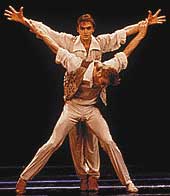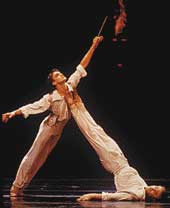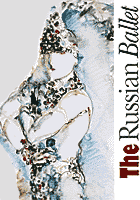
Founded by Boris
Eifman in 1977 as St. Petersburg Ballet Theater,
Eifman Ballet has revolutionized the concept of classical dance in
Russia, taking the art of ballet to its highest level of expressiveness.
Seeking to explore the artistic potential of his classically trained
virtuoso dancers, Boris Eifman set out to create a new type of
dance artist (a dancer/actor) to create a new type of art.
Eifman's dancers/actors use the solid foundation of impeccable
ballet training as a launching pad into innovative, modern choreography-personal,
expressive and dynamic. Inspired by the philosophical and dramatic motifs
in contemporary performing arts, the theater formed its unique style,
which synthesizes the art of avant-garde dance with the methods of the
20th century dramatic theater and film. Shortly after being formed, Eifman
Ballet began touring in Russia, performing to sold-out houses of Soviet
fans, hungry for original artistic expression. Despite the pressure for
Eifman to leave the country for not making "Soviet art," the company stayed
in St. Petersburg and continued to perform to tremendous popular acclaim,
yet without any government subsidies. The early star members of the Eifman
Ballet included Alla Osipenko, John Markovsky, Valery Mikhailovsky, and
Valentina Morozova. Inspired by these classical dancers' hunger for new
forms of artistic expression, Boris Eifman created his early masterpieces:
Two Voices, Boomerang, The Idiot, Crazy Day, Twelfth Night, The Duel,
and The Master and Margarita.
The success of a new generation of stars and current soloists with Eifman
Ballet-Igor Markov, Albert Galichanin, Vera Arbuzova, Yelena Kuzmina,
and Yuri Ananyan-is a brilliant and visible result of Boris Eifman's creative
method. Eifman Ballet received great international acclaim in 1988 with its first performance abroad at the Champs Elysees Theatre in Paris.
its first performance abroad at the Champs Elysees Theatre in Paris.
In 1998, after celebrating its 20th Anniversary on the stage of Bolshoi
Theatre in Moscow, the company finally received the long-overdue recognition
by the Russian cultural authorities: Eifman Ballet was awarded the title
of an "Academic Theater," the highest level of distinction for a Russian
theater company. In January of 1998 Eifman Ballet made its smashing U.S.
debut at New York City Center. Sharply contrasted against the strict conventions
of classical ballet set by famous Russian ballet troupes like Bolshoi
or Kirov,Eifman Ballet electrified the New York audiences with its vibrant,
often shocking and always original style. Hailed by the critics worldwide
as one of the most significant contributors to today's culture of ballet
arts, Eifman Ballet continues to constantly reinvent the art form.
 Anna Pavlova
Anna Pavlova
(1881-1931)
One of the world's best-known ballerinas. In 1899 she was accepted by
the Imperial Ballet. She first performed the Dying Swan - a solo choreographed
for her by Michel Fokine, 1907, and it became her signature piece for
the rest of her life. The role depended on extraordinary fluidity of movement
and the expression of poetic feeling for its effect. In 1912 she established
a dance school and organized her own dance company. In her lifetime Pavlova
became a synonym for ballet art.
| Home | Design | Art | Ballet | |||
|
||||||